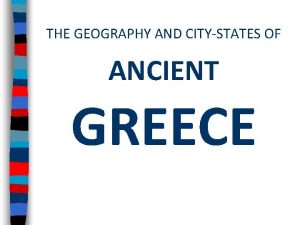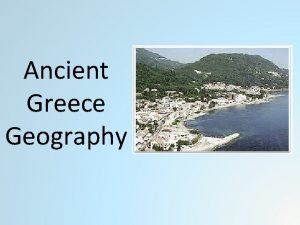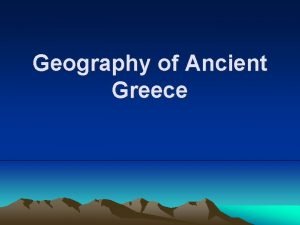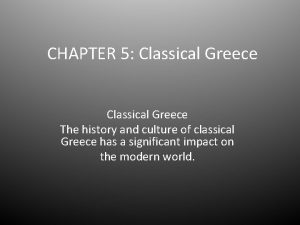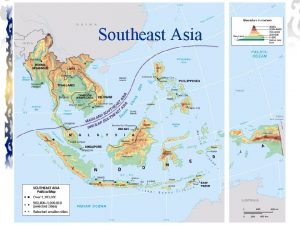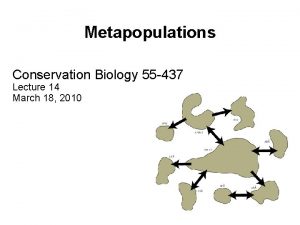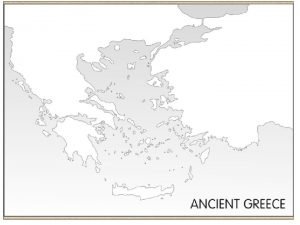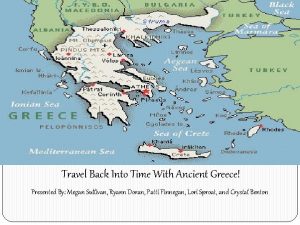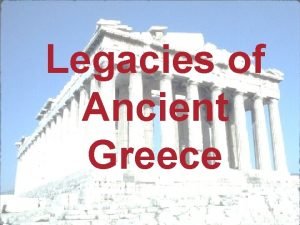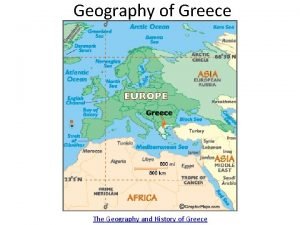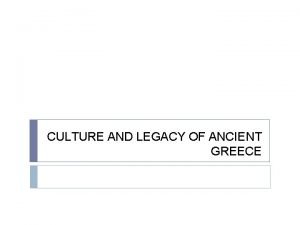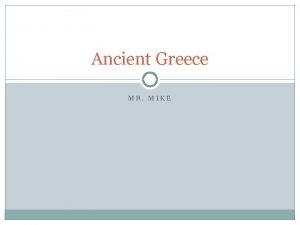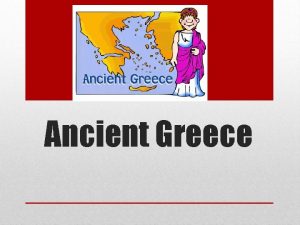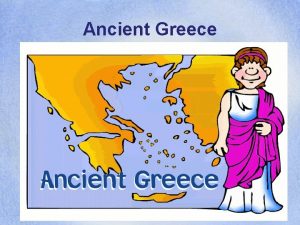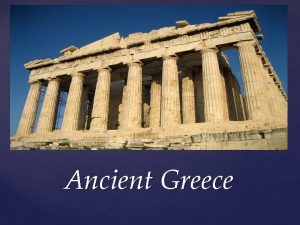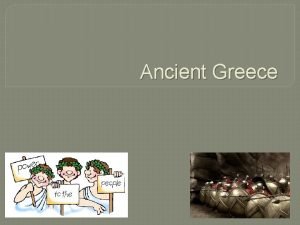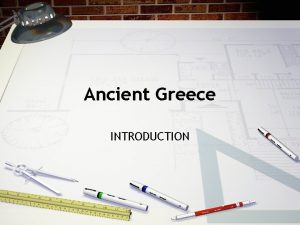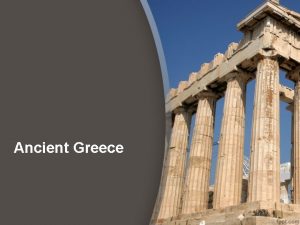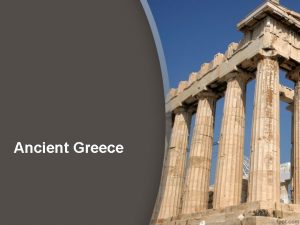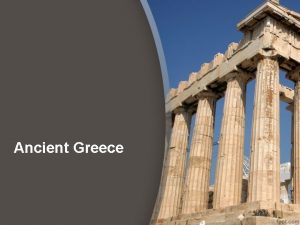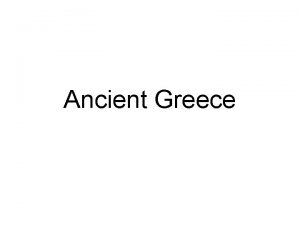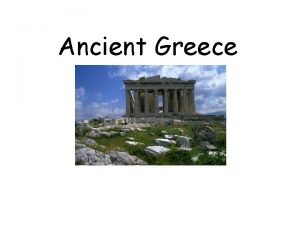Ancient Greece Chapter 7 Review Geography Mainland Greece



















- Slides: 19

Ancient Greece Chapter 7 Review

Geography • Mainland Greece is ________ • It is made of three ________; two are smaller and joined together by an _____ to create a larger ________. • The _____ Sea is to the west of Greece, the ________Sea is to the east, and the _________ Sea to the south. • Although Greece’s soil is _____ and made it difficult to farm, they could grow some _____, and a lot of _______ and ________.

Geography • Mainland Greece is mountainous. • It is made of three peninsulas; two are smaller and joined together by an isthmus to create a larger peninsula. • The Ionian Sea is to the west of Greece, the Aegean Sea is to the east, and the Mediterranean Sea to the south. • Although Greece’s soil is rocky and this made it difficult to farm, they could grow some wheat, and a lot of grapes and olives.

Minoans • The earliest Greeks were the _______ who lived on the island of ______. • The capital was _______. • The Minoans were great ______and ____. • Either because of a massive ______ or because of an ________, the ______ took over as the most important Greeks.

Minoans • The earliest Greeks were the Minoans who lived on the island of Crete. • The capital was Knossos. • The Minoans were great sailors and traders. • Either because of a massive earthquake or because of an invasion the Mycenaeans took over as the most important Greeks.

City-States • An ______ or open marketplace was also the place of the government buildings. • Before Pericles, Athenian citizens had to be __________, and ________. • Regardless of your city-state, the soldiers were called_______ and fought in a _______ formation. • The Greek name for city-state is ______.

City-States • An agora or open marketplace was also the place of the government buildings. • Before Pericles, Athenian citizens had to be free, born in the city-state and own land. • Regardless of you city-state, the soldiers were called hoplites and fought in a phalanx formation. • The Greek name for city-state is polis.

Types of Government • A _______ is led by a king or queen. • An ______ is where a few people ( usually upper class) hold power over a larger group. • A _______ is ruled by a ______ who took over power by force ( usually with the support of the lower class) • A ______ is where all citizens share power. • Sparta was an _________, even though they had two ______, • Athens was a _______.

Types of Government • A monarchy is lead by a king or queen. • An oligarchy is where a few people ( usually upper class) hold power over a larger group. • A tyranny is ruled by a tyrant who took over power by force ( usually with the support of the lower class) • A democracy is where all citizens share power. • Sparta was an oligarchy, even though they had two kings. • Athens was a democracy.

Sparta • Spartan slaves, called _______, did all the farming. • The slaves out-numbered the soldiers, so the Spartan had the biggest _____ to control the slaves. • Boys started training at age ____, became soldiers at ______, and served until age ______. • Spartan girls participated in _______ training and had more freedom than ______ women. • The council of Spartan elders, or ______, thought up the laws.

Sparta • Spartan slaves, called helots did all the farming. • The slaves out-numbered the soldiers, so the Spartan had the biggest army to control the slaves. • Boys started training at age 7 became soldiers at 18 and served until age 60. • Spartan girls participated in physical training and had more freedom than Athenian women. • The council of Spartan elders, or ephors thought up the laws.

Persian Wars • King ______ of Persia wanted to punish the ________ for helping the Ionians rebel. • The first fight, the _____ of _______, was a victory for the Greeks. • The next Persian king, _____, came back _____years later to invade Greece with ______ soldiers. • The Spartans led at the battle of _______ in a narrow ______ pass. Even though all _____ Spartans died, they gave the Greeks enough time to _______.

Persian Wars • King Darius of Persia wanted to punish the Athenians for helping the Ionians rebel. • The first fight, the Battle of Marathon was a victory for the Greeks. • The next Persian king, Xerxes came back 10 years later to invade Greece with 300, 000 soldiers. • The Spartans led at the battle of Thermopylae in a narrow mountain pass. Even though all 300 Spartans died, they gave the Greeks enough time to retreat.

Persian Wars • The Persians ______ Athens. • At ______, the Greeks used their faster, smaller _____to defeat the _______. • The final battle at _____ was again led by the ________. • The Persian Wars _____ the Greeks against a common enemy.

Persian Wars • The Persians burned Athens. • At Salamis the Greeks used their faster, smaller triremes to defeat the Persians • The final battle at Plataea was again led by the Spartans. • The Persian Wars united the Greeks against a common enemy.

Pericles/Golden Age • Athens formed the ___________ with other city-states as a defense against the Persians. • Sparta formed the _______ • ________ was elected General of Athens. • He rebuilt the ________, strengthened __________, and made the __________ to the sea. • Athens was still a ______ democracy during Pericles’ time. • The _______ was a time of great invention and expansion of Athens

Pericles/Golden Age • Athens formed the Delian League with other city-states as a defense against the Persians. • Sparta formed the Peloponnesian League • Pericles was elected General of Athens. • He rebuilt the Parthenon strengthened democracy and made the long walls to the sea. • Athens was still a direct democracy during Pericles’s time. • The Golden Age was a time of great invention and expansion of Athens

Peloponnesian War • This war lasted _____ years and the two sides were headed by _____ and ______. • The Pericles’ speech known as the _____________ gave the Athenians the courage to keep fighting. • Athens retreated behind its _____ but a ______ struck, killing 1/3 of the people including _______. • Spartans made a deal with _____ for money to build ______. • Sparta defeated _______, but all of Greece was_______.

Peloponnesian War • This war lasted 27 years and the two sides were headed by Sparta and Athens. • The Pericles’ speech known as the Funeral Oration gave the Athenians the courage to keep fighting. • Athens retreated behind its walls but a plague struck, killing 1/3 of the people including Pericles. • Spartans made a deal with Persia for money to build ships. • Sparta defeated Athens , but all of Greece was weakened.
 Geography of greece
Geography of greece Greece geographical features
Greece geographical features Greece mountains map
Greece mountains map Describe the geography of ancient greece
Describe the geography of ancient greece About 80 percent of the geography of greece is
About 80 percent of the geography of greece is Ancient greece contributions
Ancient greece contributions The legacy of ancient greece chapter 31
The legacy of ancient greece chapter 31 Chapter 5 ancient greece
Chapter 5 ancient greece Mainland southeast asia countries
Mainland southeast asia countries Mainland island metapopulation
Mainland island metapopulation Fraser health boundaries
Fraser health boundaries In 1500 mainland southeast asia was a relatively
In 1500 mainland southeast asia was a relatively World geography chapter 2 review answers
World geography chapter 2 review answers Blank map of ancient greece
Blank map of ancient greece Where was ancient greece located
Where was ancient greece located Physical education in ancient greece sparta and athens
Physical education in ancient greece sparta and athens Legacies of greece
Legacies of greece Map of ancient greece labeled
Map of ancient greece labeled Ancient greece stations
Ancient greece stations Greek stringed instrument
Greek stringed instrument
